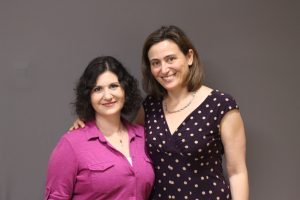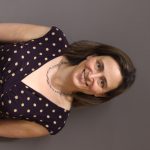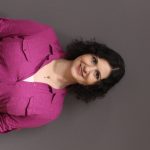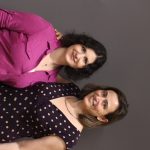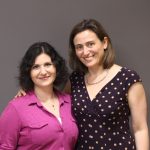Abby Volin and Karen Smith
Description
Abby Volin (38), patient to Dr. Karen Smith (45), discuss cancer diagnosis. Dr. Smith shares her journey into Oncology, compassion fatigue, and elements that allow her to continue her work.Subject Log / Time Code
Participants
- Abby Volin
- Karen Smith
Recording Locations
Sibley Memorial HospitalVenue / Recording Kit
Tier
Partnership
Partnership Type
Fee for ServiceTranscript
StoryCorps uses Google Cloud Speech-to-Text and Natural Language API to provide machine-generated transcripts. Transcripts have not been checked for accuracy and may contain errors. Learn more about our FAQs through our Help Center or do not hesitate to get in touch with us if you have any questions.
00:00 Cancer not a day has gone by that I have not thought about it. The cancer has not crossed my mind in some way and I look forward to the day where I don't think about it. I don't know when that day will come. It's been it's been almost 4 years at this point and
00:21 It might my cancer was because I was broke a positive and I knew I had I had the bracha mutation and so I was getting all the monitoring and I was
00:34 It was preventable for me and in some respect because I could have gotten prophylactic surgery and I didn't do it in time. And so that will be one of my biggest regrets and because I didn't do that and because it impacted every single aspect of my life and I think of cancer every single day or or you know, some aspect of what it's done to me, you know, I'm also kind of the biggest cheerleader. I feel very strongly about people knowing the risk and and not
01:16 The ostrich effect is not helpful sticking your head in the sand might might feel reassuring at the time. But but ultimately it it's really harmful. And so if there's anything that my story can do to convince people to maybe questions have any questions about their family history or or get certain tests or or get the courage to have surgery is that no one wants to have but you know, it's the right thing to do then, you know, that that's why I make my day.
02:01 I'm really glad you decided to do this.
02:06 He does a lot of things that really touched me. I guess one of the most important things is that you said that you still think about your cancer every single day and that's important a thing for an oncologist to hear because it's easy for us to kind of slip into a feeling that once your treatment is done and your kind of not coming into Clinic all that often and you're doing great and you're healthy and you're cured to think that the cancer is in the past and that when you come in to visit, it's kind of all just like catching up and saying hello and checking how life is going but for us to remember that this kind of a diagnosis impacts our patients every single day and it's really a life-changing event and I think about that a lot and I know it cuz other patients have said that to me yet. I can still forget that and I don't think I'm the only oncologist whoever kind of forgets that and if I see a patient's name on my clinic list who in my mind is complete.
03:06 Find certificate I go, you know, whatever. Let's go say hello, but to stop and be mindful and say you know what? This is still and always is going to be really important to that patient and understandably. So I thank you for telling me that and I like it when people continue to remind me of that.
03:25 I think I've been grappling with ever since is this idea that the pre cancer me in the post cancer near the post chemo are two totally different people everything about me has changed, you know, it's my hair didn't grow back the same my body's a different shape getting off of you know, I had a lot of steroids in my body and Sol in those came out of my system, you know is I have a lot of mood swings and I had a lot of I had a lot of side effects. I don't know if you remember as much but I do kind of going through the key know I had this really weird Oddball side effects from the chemo and then they just kind of kept going afterwards as well. You know, and I keep having kind of it was like the floodgates open though most and I just keep having weird still side effects either.
04:25 FEMA work or just from you know things out of snowballed from it. And so I've been grappling with okay. I I can't go back. I can't be who that person 4 and I have to I've Been Working on accepting that and and knowing that okay. This is this is post chemo post cancer person and coming to terms with that and knowing that yep, it has made changes a man and it has H man, but that's okay. That's okay too and just learning to you know learning to love myself again and just you know this new person in this new body and does everything that goes along with it.
05:19 Does it get easier with time?
05:22 It's been as he just said almost four years. Yeah. I know I hesitated there now a wonderful amazing loving has been and family has been supporting me the whole way. It has gotten easier with time. I'm not a patient person and so you know it before chemo. I had very long hair and it is it did not grow back quickly at all. And in fact, you know, I'm I'm over three years done with chemo and it's still not even at my shoulders which item has been very frustrating. So I've been learning and exercising and patience, but it's yeah, it's it's getting easier over time and I'm I'm not as focused on all the all the
06:22 Negative effects of cancer. It's just kind of it's just kind of slipped into the you know the daily. Well, this is just part of life now.
06:36 Do you feel like anything positive has come out of it in terms of positive changes in yourself, you know, even while I was going through chemotherapy, even when I when I had a I started this with a bilateral mastectomy because I'm broke a positive and I was not going through this again.
07:01 And a mastectomy is no joke. It is no joke of a surgery that stuff and the chemotherapy. I went through was also pretty rust on my body and I went through to preserve fertility my husband and I we we did before I went through chemo in case my ovaries did not the case they shut down during chemo and didn't recover. None of that was fun to put it lightly and frankly through all of it. I I never felt sorry for myself and and considered and still do myself incredibly lucky. I really there's really no self-pity, you know, my grandmother my maternal grandmother.
07:54 At age 44 found a lump in her breast and went to her doctor her general practitioner and he said let's keep an eye on it. Come back in 6 months.
08:07 You know and she died two years later. My mother was getting screened getting regular mammograms at H20 my sister and I have been able to get you know, we were able to know if we have the mutated Gene and and to get the the really detailed monitoring isn't even prophylactic treatment since you know, I'm I'm hopeful that the Next Generation there might have been be a cure so there.
08:45 There's just you know, I've always just considered myself lucky lucky lucky and super strong have to say Amazing Grace. You don't have a choice. It's kind of how I see it. What else are you going to do?
09:04 I had an amazing support network behind me. I didn't have to worry about anyting.
09:10 You know all I had to do with us just be sick and you know, I had any idea what I would I would say was hard was it was wintertime Norm you in system so I couldn't really go anywhere. Isolating and that it was very isolating. I was stuck in my apartment. I couldn't really be near people might my husband got a cold at one point. And so I was quarantined in my parents house. So I really couldn't be anywhere near people are in your anywhere. I can be me terms or anywhere in public. So that was that was very trying.
09:55 Bye. But. Otherwise, you know, I I I I know I knew how lucky I am just to have fun.
10:02 Now I have my family here. My husband who kept teasing him on like you must not want to leave work. I mean you come home and I'm sitting here cranky and bald and he said no he, you know, he wanted to rush home and and see me and take care of me. So
10:21 So as you may know one of my areas of kind of researcher academic interest as young women with breast cancer, and you know the impact of chemotherapy on ovarian function infertility and your kind of the massive interruptions that a cancer diagnosis can have on relationships and Family Planning and all of that stuff and you mentioned that you kind of went through some fertility preservation near you froze eggs. I think you said I've actually never asked any of my patients what that process is like not just you know, the actual procedure. I know what the procedure is like that like, what does that feel like it was at an upsetting thing for you or was that kind of just off on the side? And the big issue is the cancer in the chemo. Can you talk a little bit about how that whole aspect of it felt like I do and I laughed because it was pretty soon after the mastectomy and I was on a lot of pain killer.
11:21 A lot of painkillers so things from that timer still kind of fuzzy easy. Okay, but you know, I was being shot up with hormones. I mean it was not a fun time, but I was I was doing it because we needed are in case of emergency break glass. So again, it was just it was something it wasn't a question of doing it or not. It was we're doing it. So we just did it and I was not it wasn't fun, but it also wasn't feeling very intimate for my husband and me but it wasn't a question of whether or not we're doing it. I cried a lot that week because of my handsome migraines, but
12:16 You know it was it was something that we knew we had a we had to do just to make sure we kept all of our options open for you glad now that you did it. Yeah, I mean that was always you never know what's going to happen in the future and I was I was very fortunate my ovaries came back clicks back on I'm relatively quickly. It came back on about 3 months after I after I stopped chemotherapy and stop getting the shots the what are they called? Do you do a variance oppression show during chemotherapy?
12:59 But you know how it turns out we still are going and I still had fertility problems whether or not they're related to the chemo and I'm not sure but we still are going to use the the embryos that we froze one way or another. So we're very grateful that we do that. Yeah, it's always hard for us as doctors to bring that stuff up cuz there's like a whole lot of stuff that happens all at the same time, you know, you find out that you have cancer you have surgery planning on chemotherapy and then it's like this curveball by the way, the treatment might also take away your fertility in your ability to have children later or bring on an early menopause and you have to make decisions really fast about what to do about that and it's often often hard to talk about. So I'm glad that we made the right decision for you or the decision. It felt right cuz there's not a right answer it's whatever is right for you. So, you know, I really believed that knowledge is power.
13:59 That really wasn't a traumatic experience aren't you know, you know knowing that wasn't traumatic for me. It was oh this is a good thing to know so that we can take preventative measures and we can just be prepared for moving forward for frankly during that that. Of time I think the most traumatic part was getting a port in my chest really I was just very upset that morning and the anesthesia didn't work. I don't know that's why I was awake and then and then I just had like this big metal thing plant titanium thing in my chest and I was very aware of it. I could feel it like from the inside and I was and I felt this, you know the weight with a fan attached to my veins and that was just really strange that that that was probably the most dramatic part for me, but what what got you interested in work?
14:59 Some women, you know in their childbearing years roundabout path to the oncology and being a breast cancer doctor. I was initially going to be OBGYN doctor gynecologist to deliver babies does always interested in women's health. I was a little bit of a feminist in my younger years and then I did actually a year of Ob-Gyn training right out of medical school and I hated it. I was it was not at all for me. It was you know, I'm much more I like to sit and I like to talk and I like to think and obstetrics for anyone who's had a baby in those a lot of running and a lot of middle of the night kind of urgent things a lot of work with your hands as a surgeon and delivering babies. So within about two weeks, I realize that that was wrong.
15:59 And so I I did full year and then I switch to general medicine and during that training we spend some time on the oncology boards and I and I still have This Woman's Health and Trust. I still like weiner stand kind of young women of childbearing age from my obstetrics age and I actually met this one young woman who unfortunate have metastatic breast cancer who was in the hospital and was unfortunately very near to the end of her life. And I kind she asked me if I wanted to see pictures of her family and I was very young new doctor and I sat with her for her really one time. I shifted kind of engine and I just stayed and she had a six-year-old daughter and she showed me all these pictures and I just left in tears and I went home and it was just I don't know what happened. Actually I ended up switching rotations. I'm sure she unfortunately passed away, but that story stay with me for a long time. And for a while. I felt like I couldn't do this job because
16:59 It was too emotional and I couldn't separate couldn't go home and be a normal person and have my own life, but then I sort of feel like I had to do it because that's what really what I really cared about and I cared about curing people who who are in a better situation than this unfortunate woman and I also cared about you helping people even if they were in that unfortunate situation, so I kind of left her number of extra years of training ultimately kind of came back but I still remember that one patient and it was a number of years ago now it's so what's what's your favorite part?
17:36 At the job
17:38 I think it depends on what day.
17:41 I think the the sort of selfish reasons that I liked it or that I'm always learning and I'm often thinking and that it's teamwork. So it sort of just in terms of how it works for the all the doctors and the nurses as we work together as a big team. So I'm not usually by myself. I'm working with nurses. I work with the other Specialties of doctors, you know that surgeons and radiation doctors in the plastic surgeons and we have to coordinate care which so it's always kind of interesting to get other people's perspectives and I'm always learning. I'm privileged to work with unbelievably smart group of colleagues and always teaching me things and have amazing expertise. So I don't get bored. That's what are the selfish reason. I like my job and I like the connections is the other reason and I like that I get to know my patience. I think they get to know me a little bit.
18:37 I like knowing most of them for a really long time because fortunately most women with breast cancer do great and live long full lives. I think the least favorite part is sort of like that the mundane the documentation the filling out forms, which sometimes and Healthcare gets to be a little bit much and so the times that I really feel frustrated with my job is because I'm doing far too much of that and far too little of the more meaningful connections with patients or the more meaningful learning and thinking
19:15 Evention working as a team and that was a great reminder because I only see you tonight when I have my appointment with you yet. I remember when I was diagnosed and you know what we were thinking to be want a second opinion and you were saying don't worry we have if you could explain that process of you know, like the cancer board and how that already is. Yeah. So there's a thing called a tumor board and it's basically when all the doctors get together, we typically do it once a week. And so and it's multidisciplinary meaning it's the different types of doctors. I like them a few medical oncologists. Are there a few surgeon you radiation oncologist we generally have the geneticist or someone a genetic counselor person. They're plastic surgeons pathologist, cuz they're the ones who look at the slides and actually help make the diagnosis and then we have are imagers there also. So the people who do the mammograms and the biopsies and we also
20:15 We talked about cases and you know, it's nice for us as a team to get together every single week and we laugh a lot as well as you work, but we always get into really interesting discussions about the cases and we try to present as many cases as possible and to release her to hash out. What are we going to do together and figure out you know, what's the best approach should we do surgery first is chemo needed. Should we get a test to figure out about Kimo's should we do chemo first and you know to really sort of put together a comprehensive plan and I learned that I have to say like I often think I kind of know what people are going to say and then they say something and they just look at it from a different angle because they were trained differently or they just read an article that I didn't read or you know, something like that and so we teach each other and I I think we ultimately deliver better care because of that kind of a process and we do that at the beginning kind of like when someone's
21:15 Diagnosed but then we have ongoing discussions later on if there if there are questions that arise that impacts you other disciplines then we always make sure to kind of get back to the whole team or get back to the house. I'd conversation with just the people who are involved and I think that's a really important part of the care that we provide what happens you always come to a consensus on the cases or what happens if you don't
21:47 I wouldn't say that there's always consensus meaning that everybody agrees. We will generally come to a plan that the that the key people agree. And you know, you said before kind of knowledge is power and he was so I would say to you that there's a lot of situations in which there's not necessarily a right answer for the one single best treatment in there are some situations where there is an obvious like this is what we should recommend that there's a lot of situations where there are choices and there are pros and cons of each and honestly, if you saw it tender for doctors you get 5 who said to do Choice a and 5% to do Choice be until well off and go back to my patients Insight, you know, there was no consensus and here are the reasons to think about this one in here are the reasons to think about that one. And then we talked about the pros and the cons of each and we talked about kind of
22:42 What seems right or what's most important to that individual patient? So there's not necessarily consensus that there is ultimately a decision. I often will encourage patients to get a second opinion too if they feel uncomfortable cuz I think the most important thing is that you feel comfortable not about me and if you want to go to the other place, that's fantastic is it that other place is kind of validated that you want to come back here. That's also fantastic and I'm not at all offended by that and I actually learn from it generally.
23:13 Something else you mentioned and it's something that I I I I don't I don't know how you deal with it. But compassion fatigue. Is that how is that something you you deal with because I'm
